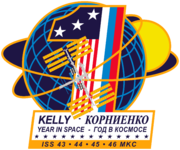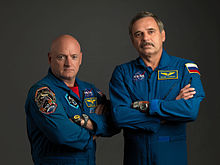| Mission type | Long-duration expedition |
|---|---|
| Mission duration | 340d 8h 43m |
| Orbits completed | 5,356 [1] |
| Expedition | |
| Space station | International Space Station |
| Began | March 27, 2015, 19:42 UTC |
| Ended | March 2, 2016, 04:25 UTC |
| Arrived aboard | Soyuz TMA-16M |
| Departed aboard | Soyuz TMA-18M |
| Crew | |
| Crew size | 2 |
| Members | |
| EVAs | 4 |
| EVA duration | 23h54m |

 Scott Kelly and Mikhail Kornienko | |
The ISS year-long mission was an 11-month-long scientific research project aboard the International Space Station, which studied the health effects of long-term spaceflight.[2] Astronaut Scott Kelly (ideally suited for the experiment as the identical twin of Mark Kelly) and cosmonaut Mikhail Kornienko spent 340 days in space with scientists performing medical experiments. Kelly and Kornienko launched on 27 March 2015 on Soyuz TMA-16M, along with Gennady Padalka.[3][4][5][6] The mission encompassed Expeditions 43, 44, 45, and 46.[7] The pair safely landed in Kazakhstan on March 2, 2016, returning aboard Soyuz TMA-18M with Sergey Volkov.[8] The mission supported the NASA Twins study, which helps shed light on the health effects of long-duration spaceflight, which is of interest for Mars missions especially.[9]
On 12 April 2019, NASA reported medical results from the NASA Twins Study, which demonstrated several long-lasting changes, including those related to alterations in DNA and cognition when one twin was compared with the other.[10][11]
- ^ Spacefacts
- ^ Jeffrey Kluger (18 Dec 2014). "Meet the Twins Unlocking the Secrets of Space: NASA's One-Year Mission with Mark and Scott Kelly". Time. Retrieved 2015-12-14.
- ^ "Historic yearlong mission crew launches to space station on Soyuz TMA-16M". collectSPACE. 27 March 2015. Retrieved 2015-12-14.
- ^ AFP (27 March 2015). "Soyuz spacecraft with Russian, US astronauts blasts off for year-long mission". Australian Broadcasting Corporation. Retrieved 2015-12-14.
- ^ Brooks Hays (27 March 2015). "Soyuz rocket launches yearlong space station crew". United Press International. Retrieved 2015-12-14.
- ^ Irene Klotz (27 March 2015). "U.S., Russian crew blasts off for year-long stay on space station". Reuters. Retrieved 2015-12-14.
- ^ Cite error: The named reference
planetarywas invoked but never defined (see the help page). - ^ "One-Year Crew Returns from Space Station March 1; Live Coverage on NASA TV". Nasa.gov. 2016-02-24. Retrieved 2016-02-25.
- ^ Gushanas, Timothy (2017-01-30). "First Look at Findings of NASA Twins Study". NASA. Retrieved 2017-02-03.
- ^ Zimmer, Carl (12 April 2019). "Scott Kelly Spent a Year in Orbit. His Body Is Not Quite the Same - NASA scientists compared the astronaut to his earthbound twin, Mark. The results hint at what humans will have to endure on long journeys through space". The New York Times. Retrieved 12 April 2019.
- ^ Garrett-Bakeman, Francine E.; et al. (12 April 2019). "The NASA Twins Study: A multidimensional analysis of a year-long human spaceflight". Science. 364 (6436): eaau8650. Bibcode:2019Sci...364.8650G. doi:10.1126/science.aau8650. PMC 7580864. PMID 30975860.